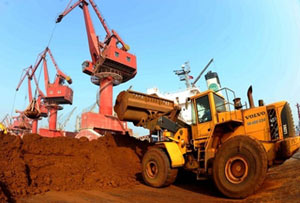Biz Unusual
Fruits give farmers juicy bite of profits
By Duan Yan in Qixia and Hu Yongqi in Beijing (China Daily)
Updated: 2010-11-04 15:52
 |
Large Medium Small |
What is worse for old hands like Sun is that the shortage has attracted many new players to enter the game. Although it is hard to estimate the number of buyers this year, industry analysts described the market as "wide open" due to the low investment threshold for agricultural products.
"Speculators figure out the overall supply and demand of agricultural products and start collecting (those in short supply)," said Li Minghui, a research fellow at the Chinese Academy of Agricultural Sciences' institute of agricultural economics and development.
Sun Fengjuan, who used to trade in corn and rice, is one of the new players. She arrived in Qixia on Oct 1 to buy 300 tons of apples.
"But the price kept rising and the quality was not that good, so I decided to be cautious and just get 100 tons," said the businesswoman from Jiamusi in Heilongjiang province.
"I'm not sure I can make a profit from the apple business but I'm already here, so I'll take the bet," she added.
As the produce being gambled on are non-staple foods in China, researcher Li said the government does not monitor the changing prices or keep national reserves.
This allows batches of fruit to be freely traded - often before it even ripens.
In August, wholesaler Han Lizhi said she paid 260,000 yuan ($39,000) to reserve 350 mu (23 hectares) of farmland in Jilin province growing Chinese cabbage. However, two months later, a broker offered her more than 400,000 yuan for entire yield, predicted to be 1,300 tons.
Han, who has run a stall at Shuangxing Market in Dalian, Liaoning province, for 26 years, declined the offer, believing an expected decrease in production "would push prices even higher".
She was right. On Oct 19, the price of Chinese cabbage rose from 0.8 yuan a kilogram to 1.1 yuan. A week later, it rose again to 1.5 yuan a kilogram.
Big business
Another gamble farmers and wholesalers are taking is with cold storage, the destination for much of the produce bought in Qixia this year.
"About 80 percent of growers will put their apples in the cold storage," said Liang Aidong, 42, who has an orchard covering 12 mu (0.8 hectare) in Qixia's southern Guanli township.
Qixia has more than 600 cold storage facilities able to stock up to 1 million tons, roughly 70 percent of the city's total annual output, according to Qixia's fruit industry bureau.
The fruit and vegetables will stay there until the peak sale season: Spring Festival, the Chinese new year holiday, which falls according to the lunar calendar in either January or February.
"Prices of Chinese cabbage will probably hit 2.5 yuan a kilogram then," explained Dalian trader Han, 44.
|
|||||||
However, veteran trader Sun Shixian revealed much of the money is recycled as loans to brokers who cannot afford to pay farmers for their yields.
"It's difficult to get a loans from the bank so we have to borrow from the cold storage owners," he said, explaining that, on top of the storage fee, traders are usually charged 10-percent interest on the loans (the bank charges 6 to 7 percent).
Even when the produce is ready to be shipped, getting food from the "farm to the fork" is far from simple and, for many, is a serious factor driving up prices.
As logistics services is China remain relatively poor, companies are experiencing a great deal of wastage during distribution.
 Special Coverage: Rare as it is
Special Coverage: Rare as it is
